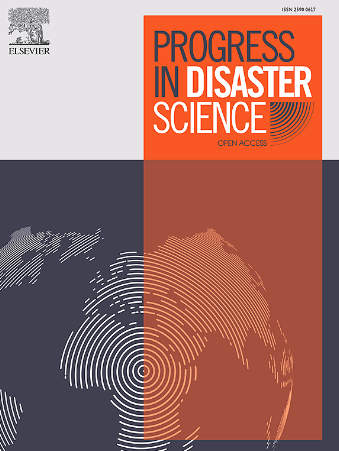Assessing the role of international agencies in disaster governance in Nepal
IF 3.8
Q3 ENVIRONMENTAL SCIENCES
引用次数: 0
Abstract
International agencies are an essential part of global disaster governance and played an important role in shaping global mandates such as Sustainable Development Goals (SDG) and the Sendai Framework of Disaster Risk Reduction (SFDRR). Disaster Management and Governance are multi- disciplinary and interconnected, so it is important to understand the role of international agencies in strengthening and managing them. This qualitative case study encompassed a literature review, stakeholder consultation, and key informant interviews, contextualizing 2015 Nepal earthquake in understanding the role of international agencies in the paradigm shift of disaster governance in Nepal. The findings of the study presented here have briefly discussed the engagement of international agencies in legislation formulation, institutional arrangement, and resource allocation. The study has reflected that disaster-related legislation in the country is largely influenced by international frameworks, and its implementation, which depends on technical and financial support from international agencies. The study also shows a significant knowledge gap in understanding the comprehensive disaster management approach among government officials and development professionals, reflecting a weak fundamental ground in shaping the disaster governance of the country. The study has suggested a robust framework for need assessment to ensure the support of international agencies in most required aspects of disaster governance.
评估国际机构在尼泊尔灾害治理中的作用
国际机构是全球灾害治理的重要组成部分,在制定可持续发展目标(SDG)和仙台减少灾害风险框架(SFDRR)等全球任务方面发挥了重要作用。灾害管理和治理是多学科和相互关联的,因此了解国际机构在加强和管理它们方面的作用是很重要的。本定性案例研究包括文献综述、利益相关者咨询和关键信息提供者访谈,以2015年尼泊尔地震为背景,了解国际机构在尼泊尔灾害治理范式转变中的作用。本文介绍的研究结果简要讨论了国际机构参与立法制定、体制安排和资源分配的情况。这项研究表明,该国与灾害有关的立法在很大程度上受到国际框架及其执行的影响,这取决于国际机构的技术和财政支持。该研究还表明,政府官员和发展专业人员在理解综合灾害管理方法方面存在重大知识差距,反映出在形成国家灾害治理方面的基础薄弱。这项研究提出了一个强有力的需求评估框架,以确保国际机构在灾害治理最需要的方面得到支持。
本文章由计算机程序翻译,如有差异,请以英文原文为准。
求助全文
约1分钟内获得全文
求助全文
来源期刊

Progress in Disaster Science
Social Sciences-Safety Research
CiteScore
14.60
自引率
3.20%
发文量
51
审稿时长
12 weeks
期刊介绍:
Progress in Disaster Science is a Gold Open Access journal focusing on integrating research and policy in disaster research, and publishes original research papers and invited viewpoint articles on disaster risk reduction; response; emergency management and recovery.
A key part of the Journal's Publication output will see key experts invited to assess and comment on the current trends in disaster research, as well as highlight key papers.
 求助内容:
求助内容: 应助结果提醒方式:
应助结果提醒方式:


